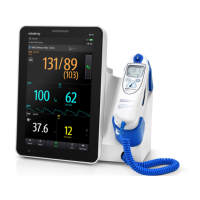3 - 22
1. Select the Main Menu quick key → from the System column select Maintenance
→ input the required password → select .
2. Select the Standby tab, switch on Auto Enter Standby, and set the Auto Enter
Standby Time.
After setting, the monitor enters standby mode automatically if no operation is detected
after the Auto Enter Standby Time.
• Pay attention to the potential risk of placing the monitor to standby. In the
standby mode, the monitor stops all parameter measurement and disable all
the alarm indications, except for the battery low alarm.
If the monitor enters standby mode in Continuous Monitoring mode, you can:
■ Change the patient location from the standby screen.
■ Select Discharge Patient on the standby screen to discharge a patient.
■ Select Resume monitor on the standby screen to exit the standby mode.
If the monitor enters standby mode in Spot Check mode, you can select anywhere on
the touchscreen to exit the standby mode.
3.10.2 Inputting Patient Information
It is recommended to input the patient information correctly before monitoring. Follow
this procedure:
1. Select patient information area and the Patient Management menu is displayed.
2. Input the Patient ID, name, date of birth, Patient Category, and Gender.
3. Select OK.
3.10.3 Accessing Parameter Setup Menus
Each parameter has a setup menu in which you can adjust the alarm and parameter
settings. You can enter a parameter setup menu by using the following methods:
■ In Continuous Monitoring mode, select the parameter area to display a
parameter setup menu.
■ In Spot Check mode, select the Main Menu quick key → from the Parameters
column select Setup → select the desired parameter.
3.10.4 Checking the Alarm Settings
For patients under continuous monitoring, make sure the alarm limits are appropriate
for the currently admitted patient. To check the alarm limits, in Continuous Monitoring

